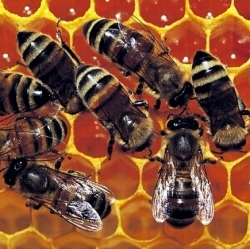
A small number of bees are vital for crops such as oilseed rape, apples and strawberries, according to the University of Reading team. But protecting a wide range of bees would "provide an insurance policy against future ecological shocks, such as climate change", the scientists say. The value of wild bee pollination is estimated at £1bn a year in the UK.
Prof Simon Potts, director of the Centre for Agri-Environmental Research at Reading, said: "The few bee species that currently pollinate our crops are unlikely to be the same types we will need in the future. "It is critical to protect a wide range of bees and other insects now so that, as Britain’s climate, environment and crop varieties change, we can call on the pollinating species which are best suited to the task. "We can’t just rely on our current starting line-up of pollinators.
"We need a large and diverse group of species on the substitutes’ bench, ready to join the game as soon as they are needed, if we are to ensure food production remains stable. But crucially the commonest wild bees are the most important, which gives us the ‘win-win’ situation where relatively cheap and easy conservation measures can support these and give maximum benefit for the crops.
"For example, planting wild flowers with wider grassy margins around crops, as well as less intensive or more organic farming, all enhance abundance of the key crop-visiting bees."
